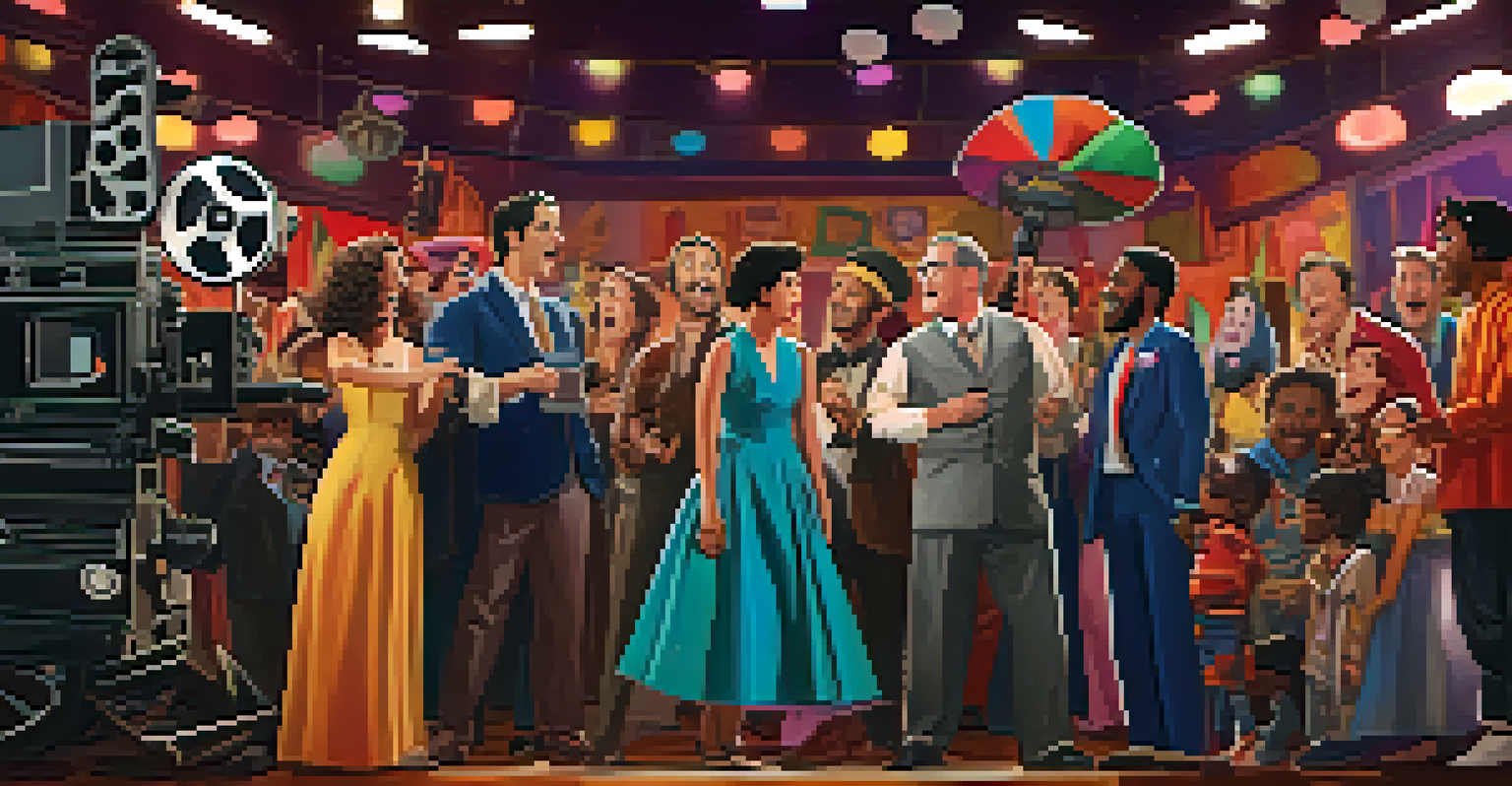Cultural References: Humor's Role in Film Context

Understanding Cultural References in Films
Cultural references in films serve as a bridge between the audience and the story being told. They can draw on shared experiences or knowledge, making the narrative more relatable and engaging. For instance, a reference to a well-known song or event can evoke nostalgia or laughter, enriching the viewer's experience.
Humor is just another way of saying something profound.
These references often require some cultural literacy, as they bring added depth to the dialogue and plot. When characters mention iconic films or historical moments, it creates a connection that resonates with the audience's own experiences. This shared knowledge allows for a more immersive viewing experience.
Moreover, the effectiveness of these references can vary widely based on the audience’s familiarity with them. A reference that resonates with one demographic might fall flat with another, highlighting the importance of context in film-making.
The Role of Humor in Film Context
Humor plays a pivotal role in films, acting as a tool for both entertainment and social commentary. It can lighten heavy themes or provide a clever critique of societal norms. Films like 'The Big Lebowski' and 'Monty Python and the Holy Grail' masterfully blend humor with cultural references, making poignant statements while keeping audiences laughing.

Often, humor allows filmmakers to address difficult topics in a way that feels accessible. By wrapping serious messages in comedy, directors can engage viewers without overwhelming them, creating a space for reflection amidst the laughs. This balance is what makes films memorable.
Cultural References Enhance Engagement
Cultural references in films create relatable connections, making narratives more immersive and engaging for audiences.
Furthermore, humor can also serve as a universal language, breaking down barriers of understanding. A well-placed joke can draw in viewers from diverse backgrounds, fostering a sense of community around shared laughter.
Examples of Cultural References in Comedy Films
Comedy films are particularly rich in cultural references, as they often tap into pop culture to elicit laughter. A quintessential example is 'Airplane!', which parodies a variety of film genres and famous lines, creating a tapestry of humor that appeals to a broad audience. Each reference not only enhances the comedy but also showcases the filmmakers' understanding of their cultural landscape.
Cultural references are the connecting tissue between the audience and the narrative.
Films like 'Shaun of the Dead' cleverly weave in references to classic zombie films, creating a playful homage while simultaneously crafting their own narrative. By doing so, they engage both horror fans and general audiences, making the film more enjoyable for everyone.
Such references are not just for laughs; they can also serve to reflect societal attitudes and trends. By pinpointing specific cultural moments, these films help to encapsulate the zeitgeist of their time, offering insights into the collective psyche of society.
Cultural References as a Tool for Character Development
Characters often use cultural references to express their personality and background, revealing layers of their identity. For example, a character quoting a famous line from a classic film can signal their sense of humor or cultural knowledge. This not only makes them more relatable but also adds depth to their role within the story.
Moreover, humor derived from cultural references can highlight contrasts between characters. In films like 'Mean Girls,' the witty banter often reflects the social hierarchies at play, using pop culture to underscore differences in status and worldview. This interplay can drive character arcs and enhance the narrative.
Humor Bridges Cultural Differences
Humor serves as a universal language, fostering community and connection among diverse audiences while providing social commentary.
Ultimately, these references create a more vibrant and believable world. When characters speak in the language of their culture, it fosters authenticity, allowing viewers to connect with them on a more personal level.
The Impact of Humor on Audience Engagement
Humor has a unique ability to engage audiences, making them more invested in the story. When viewers laugh, they often feel a stronger connection to the characters and the plot. This emotional engagement can lead to a more memorable viewing experience, as laughter often enhances recall of the film's themes and messages.
Additionally, films that successfully use humor can foster a communal viewing experience. People tend to remember the films they laughed at with friends or family, often quoting lines and sharing inside jokes long after the credits roll. This shared laughter cultivates a sense of belonging among viewers.
Moreover, humorous cultural references often lead to discussions beyond the film itself. They encourage viewers to explore the cultural context or history behind the jokes, enriching their understanding and appreciation for both the film and the culture it references.
Navigating Humor Across Different Cultures
Humor can be a tricky terrain to navigate, especially in films that reach international audiences. What is considered funny in one culture may not translate well to another, leading to potential misunderstandings. Filmmakers often have to strike a balance between universal humor and culturally specific references.
For instance, the success of films like 'Borat' hinges on its cultural satire, which may resonate differently based on geographical context. While some audiences may find it hilarious, others might perceive it as offensive. This highlights the importance of sensitivity and awareness in cross-cultural humor.
Future Trends in Film Humor
The evolving landscape of global audiences and streaming platforms will lead to more diverse cultural references and innovative comedic storytelling.
Ultimately, successful filmmakers often find ways to adapt their humor to appeal to a broader audience without losing their unique voice. By understanding and respecting cultural differences, they can create films that resonate on multiple levels, inviting audiences to laugh together.
The Future of Humor and Cultural References in Film
As our world becomes increasingly interconnected, the future of humor in film will likely involve even more diverse cultural references. Filmmakers are now more aware of global audiences, and this awareness can lead to richer storytelling that reflects a variety of experiences. This evolution can provide fresh perspectives and innovative comedic styles.
Moreover, the rise of streaming platforms has changed how audiences consume films, allowing for niche content that celebrates specific cultural references. This shift creates opportunities for comedians and filmmakers to explore unique narratives that might not have found a place in traditional cinema.

Looking ahead, we can expect humor to continue playing a vital role in film, serving as both a reflection of cultural identities and a means of connection. As filmmakers embrace this dynamic, audiences can look forward to a future filled with laughter, insight, and shared experiences.